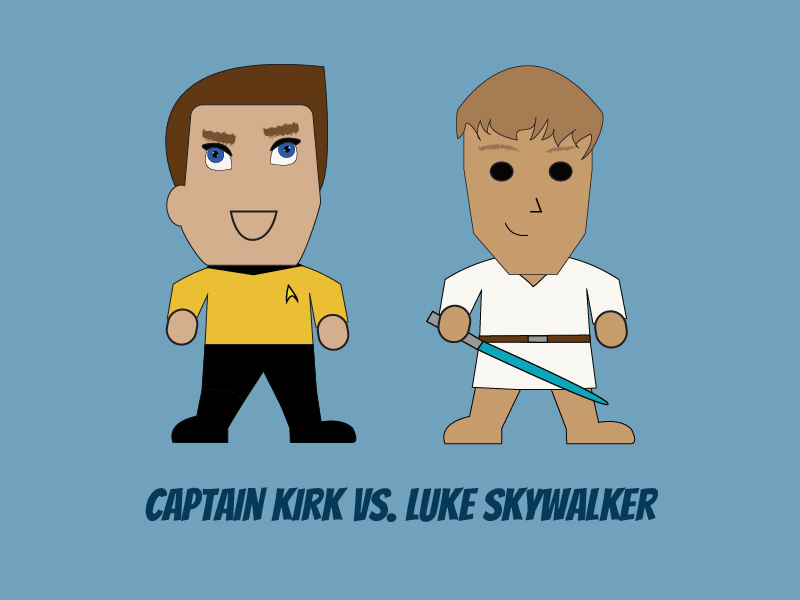
Nothing’s perfect, but some things are closer than others. Even in arguments of art, and all that term encompasses—which is an argument itself—there is oftentimes a clear answer.
The Beatles are clearly better than the Stones, pie is clearly better than cake and Star Trek is clearly in a league far, far above Star Wars. While each of these matchups is worthy of its own straightening of the record, it is the third to which I will shift my laser-focus.
I should preface my argument with the admission that I am a fan of both contenders. I believe this only adds further credence to my argument, as I haven’t deafened myself to the opposition, such as my father who drives his index fingers deep into his eardrums every time Hillary Clinton is on television.
Star Wars is a fairy tale and, like all fairy tales, it holds one, simple message: good beats evil, evil makes a comeback, but good pulls it out in the end—think Robert Mitchum in “The Night of the Hunter” playing with his hands.
The overarching plot of Star Wars centers around Luke Skywalker, who is plucked from obscurity—as tends to happen—and is forced to fulfill his destiny as savior of the universe, with a few familial plot twists along the way. The dark side is evil, and the most powerful; the light side is good, and being good has its own rewards, I guess.
Star Wars is often referred to as a space opera, which is apt, as the concepts are broad and the plot twists outrageous. Of course, the best thing about Star Wars is the imagination—there’s cowboys and samurais, giant dogs and midget-bears, telekinesis and laser swords, and all in space! It’s wacky fun, to be sure.
While Star Trek is certainly fun, and has its fill of goofy creatures—the tribble episode checks both of those boxes—there’s a weight to it not found in Star Wars. Much of this weight comes from the fact that Trek is set in our own reality, in a time not far removed from our own, giving it plenty of social commentary leeway.
This is exemplified to perfection in the Next Generation episode, “The Measure of a Man,” in which Data, an advanced, humanoid robot, argues in court for his basic “human” rights. The judge rules in his favor, declaring, “does Data have a soul? I don’t know that he has. I don’t know that I have. But I have got to give him the freedom to explore that question himself.”
Whereas Star Wars is more fantasy than sci-fi, Trek is pure sci-fi, which means it’s more concerned with grand ideas than operatic moralizing. Take “Star Trek: The Motion Picture,” which explores ideas of evolution and religion through a sentient U.S. probe, dissatisfied with its capabilities, seeking to become a higher being. Or, one could look at the fourth Trek film, “The Voyage Home,” which simply entreats us to save the whales—as well as to turn down our music when in public.
The crux of Star Trek has always been exploration, showing how far human curiosity and ingenuity can take the species, looking beyond the petty concerns of our modern day. One of the more notable aspects of Star Trek is it being one of the few sci-fi universes taking place in a future that isn’t a nuclear wasteland or commandeered by haughty robots. Instead, it’s an optimistic future, assuming that we, as a species, won’t shoot ourselves in the foot then work our way up, which is quite the leap of logic.
For example, the original series—in 1966—included a crew of all nationalities, a United Federation of Planets and world peace (among humans, at least). Where Star Wars offers exceptional broad entertainment, Star Trek does the same, but—in addition to featuring the first interracial kiss on scripted television—it dared to mix the races of entertainment and education.
To address Star Wars’ larger cultural stamp, it can be attributed to one fact: Star Wars has a mere 6 movies—or 3, depending on whom you ask—while Star Trek has 12 movies and 5 T.V. shows (I’m not counting animation). Therefore, Star Wars has a wider entry point; and the breadth of Star Trek is an imposing figure to the nerd neophyte.
In closing, the two franchises are more different than alike. Star Trek offers something intellectual that Star Wars doesn’t even attempt to propose. So while I believe the scales are tipped in Star Trek’s favor, making it the clear winner in the debate, I declare the win moot, as the two should never be pitted against each other in the first place.
Star Wars and Guardians of the Galaxy—that’s a battle. Star Trek and The Twilight Zone—that’s a battle. But Star Wars and Star Trek? It’s like if the sky switched places with the ocean and, as a result, it rained humpback whale and fishermen caught pigeons—it doesn’t make any sense.
Check out our column by Cindy Brady about why ‘Star Wars’ is better.

